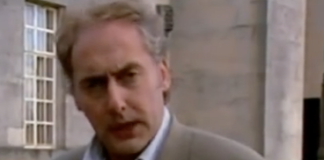- Opposites attract - 26th February 2026
- Upset coffee - 25th February 2026
- Not acting the part - 24th February 2026

After details of his early journalistic career and a look at the media landscape today, here our Editor, Phil Parry, explains his own more recent illness.
As a journalist you know the ‘story’ is all-important.
In telling that story you divorce yourself from the events, so it is the details not yourself that come through. I have lost count of the number of times people have had a go at me for things that ‘I’ have said.

But as a reporter friend said recently: “It’s not ME saying it!”. We are just the messengers, so don’t shoot us!
This time though, I am at the centre of the story and I can’t avoid that.
A few years ago I was diagnosed with a condition called Hereditary Spastic Paraplegia (HSP).
This is a rare disease which is often mis-diagnosed as rheumatism. It is a slow crippling of the lower limbs – I walk with a stick now and in a few years I will probably be in a wheelchair. HSP is a bit like MS but far less serious.
In my early days in journalism on The South Wales Echo and at BBC Wales, where I was for 23 years until 2010, it was not a problem. But the condition is with you from birth (hence the name), becoming more and more noticeable, until finally even you have to admit things are not right.

For a year I was in and out of the University Hospital of Wales (UHW), in Cardiff, being prodded and examined after I had fallen flat on my face. A baffled consultant scribbled furiously on a notepad in front of him as he fired questions at me.
On one occasion I was sent for a blood test down the corridor. In UHW (as in many other hospitals) giving blood is rather like being in a factory and, after pulling a ticket down from a special machine like those at a cheese counter, you wait your turn outside the main room in a seating area.


As I sat and waited this time, a woman screamed from inside: “OUCH!!!! FUCKING HELL!”. Everyone looked at each other and I could see the expression on many people’s faces of ‘there is no way I’m going in there’!
But the blood test was inconclusive.
On another occasion when I had to take off all my clothes and maintain an extremely undignified position, I was asked whether I minded if a very attractive female trainee watched. I did mind actually, and said so!
Throughout all of this, notes were taken by the consultant as he tried to work out what was going on. I remember he said: “This is a bit like a detective story. We look at all the evidence and come to a conclusion”.

The consultant – who was excellent – was a bit like the stereotype of the clever but eccentric doctor. He was always running late, and I remember before one appointment he had to rush out because he had forgotten to buy a present for a loved one.

One of the great things about him (when you finally got inside the consulting room) was that you gained the distinct impression he was interested in YOU as a person. In fact when he found out I was a journalist he seemed extremely pleased, and kept telling me about a book he planned to write.
After several months of these visits the test results came back showing nothing, and he started asking me about my family background. I thought: “Ah, there is something going on here!”.
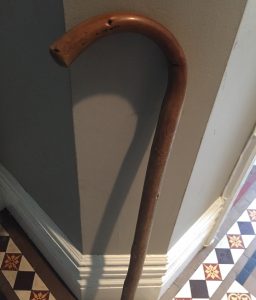
The consultant’s side-kick wanted to know how old my parents were when they started using a stick, then my grand-parents and even further back. Of course it’s impossible to remember or know these things!
Finally the consultant twirled his pen and delivered his verdict: “You have Hereditary Spastic Paraplegia”. He explained this to me in highly-scientific terms which I didn’t really understand, but they boil down to a gradual corrosion of the nerves in the spine which tell your legs to do things.
“There is no cure” he said cheerfully “although perhaps many years in the future, we will come up with an answer after stem-cell research (which is opposed by Christian fundamentalists)“.
“But“, he added when he saw the horrified look on my face, “it is very slow so you will have time to adjust”.
‘I feel fine, what is he on about?’, I thought.
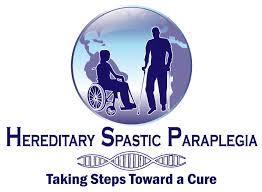
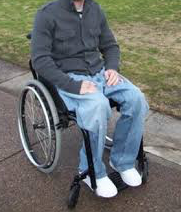
A few weeks later I was sent to be measured up for a stick, and I must admit coming home with that was quite an emotional experience, as it dawned on me what lay ahead. I was also given a set of exercises I was meant to do twice a day to keep my muscles supple.
These exercises are things like sliding down a wall, hanging off a step for a few seconds, and touching the bottom of your shin several times. I find the ones in the early morning when no one is around, easy enough to do, but I often forget the ones in the afternoon (or pretend to myself I forget them) when I am busier.
There is also a very real issue of embarrassment. I always think people believe I am a bit weird if they see me doing these strange exercises.
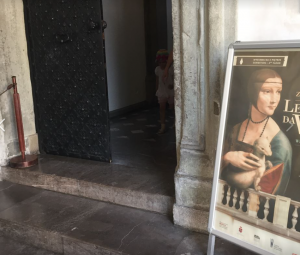
The consultant was right – it is extremely gradual. You only become aware of the progress of this condition over years, not weeks.
For example, I used to find it easy enough to go to my favourite cafe for a regular coffee. Now that is a bit of a struggle.
Even getting up from my chair is difficult.
Unfortunately I have had to give up alcoholic drink – because if I have one I am falling all over the place as though I have had a skinful.
I have a shuffling gait now and always look down in case I trip and fall. I’m like an old man, even though I am only 55!
You also become extremely tired. I have to have a nap in the afternoon.
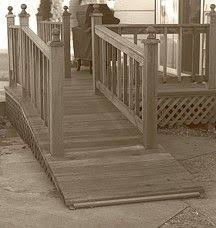
But it could be a lot worse.
There is no pain, which I know many other sufferers of HSP must handle, and there are numerous benefits, including seeing how people are basically good. They will always get up to offer their seat on crowded buses or trains.
You are also given a valuable insight into the lives of other disabled people. The key thing is that you just want to be treated exactly the same as everybody else.
Those knobbly lower kerbs on the corner of pavements? VERY useful. Handrails, even lifts next to steps. EXTREMELY important.

On one occasion, in a continental European castle, I had paid my money at an easily-accessible kiosk to see the famous painting ‘Lady With An Ermine’ by Leonardo da Vinci but I was completely stumped when I was confronted with a set of steps in another part of the castle to see the actual painting. Not only was there no lift, there was not even a handrail! I had no way of getting up. I had paid my money but never saw the picture!
Anyway, my mind is OK, as far as it ever was.
So as long as I have a notebook, a telephone and a computer I can continue causing trouble on my website!
I feel extremely privileged.
Tomorrow – why a leading Welsh Labour figure on precursor group to the ‘Yes’ campaign endorses Tony Blair about opposition to devolution in the party.









